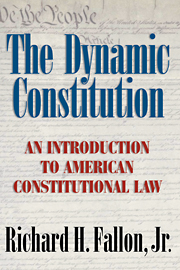Book contents
- Frontmatter
- Contents
- Preface
- Prologue: Bush v. Gore
- Introduction: The Dynamic Constitution
- Part I Individual Rights Under the Constitution
- Part II The Constitutional Separation of Powers
- Part III Further Issues of Constitutional Structure and Individual Rights
- Appendix: The Constitution of the United States
- Notes
- Index
Introduction: The Dynamic Constitution
Published online by Cambridge University Press: 25 July 2009
- Frontmatter
- Contents
- Preface
- Prologue: Bush v. Gore
- Introduction: The Dynamic Constitution
- Part I Individual Rights Under the Constitution
- Part II The Constitutional Separation of Powers
- Part III Further Issues of Constitutional Structure and Individual Rights
- Appendix: The Constitution of the United States
- Notes
- Index
Summary
[O]ur Constitution … is an experiment, as all life is an experiment.
– Justice Oliver Wendell Holmes, Jr.Although the constitution of the united states is a single written document, American constitutional law – the subject of this book – is a complex social, cultural, and political practice that includes much more than the written Constitution. Courts, and especially the Supreme Court of the United States, interpret the Constitution. So do legislators and other governmental officials as they consider their responsibilities. Very commonly, however, “interpretation” of the Constitution depends on a variety of considerations external to the text. These include the historic practices of Congress and the President, previous judicial decisions or “precedents,” public expectations, practical considerations, and moral and political values. By talking about constitutional law as a “practice,” I mean to signal that factors such as these are elements of the process from which constitutional law emerges.
To be sure, arguments about how to interpret the Constitution occur frequently in constitutional practice – not least among Justices of the Supreme Court. (Among the difficulties in studying constitutional law is that the rules of constitutional interpretation are nowhere written down in authoritative form.) Nonetheless, a few fixed points command nearly universal agreement. First, at the center of the frequently argumentative practice of constitutional law stands the written Constitution of the United States. Second, when the Supreme Court decides a case, it is almost universally supposed that its ruling binds public officials as well as citizens, despite their possibly contrary views.
Information
- Type
- Chapter
- Information
- The Dynamic ConstitutionAn Introduction to American Constitutional Law, pp. 1 - 28Publisher: Cambridge University PressPrint publication year: 2004
